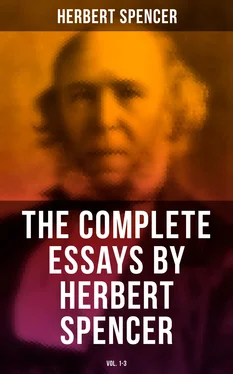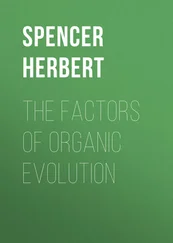In the co-ordinate origin and gradual differentiation of Poetry, Music, and Dancing, we have another series of illustrations. Rhythm in words, rhythm in sounds, and rhythm in motions, were in the beginning parts of the same thing, and have only in process of time become separate things. Among existing barbarous tribes we find them still united. The dances of savages are accompanied by some kind of monotonous chant, the clapping of hands, the striking of rude instruments: there are measured movements, measured words, and measured tones. The early records of historic races similarly show these three forms of metrical action united in religious festivals. In the Hebrew writings we read that the triumphal ode composed by Moses on the defeat of the Egyptians, was sung to an accompaniment of dancing and timbrels. The Israelites danced and sung "at the inauguration of the golden calf. And as it is generally agreed that this representation of the Deity was borrowed from the mysteries of Apis, it is probable that the dancing was copied from that of the Egyptians on those occasions." Again, in Greece the like relation is everywhere seen: the original type being there, as probably in other cases, a simultaneous chanting and mimetic representation of the life and adventures of the hero or the god. The Spartan dances were accompanied by hymns and songs; and in general the Greeks had "no festivals or religious assemblies but what were accompanied with songs and dances"—both of them being forms of worship used before altars. Among the Romans, too, there were sacred dances: the Salian and Lupercalian being named as of that kind. And even in Christian countries, as at Limoges, in comparatively recent times, the people have danced in the choir in honour of a saint. The incipient separation of these once-united arts from each other and from religion, was early visible in Greece. Probably diverging from dances partly religious, partly warlike, as the Corybantian, came the war-dances proper, of which there were various kinds. Meanwhile Music and Poetry, though still united, came to have an existence separate from Dancing. The primitive Greek poems, religious in subject, were not recited but chanted; and though at first the chant of the poet was accompanied by the dance of the chorus, it ultimately grew into independence. Later still, when the poem had been differentiated into epic and lyric—when it became the custom to sing the lyric and recite the epic—poetry proper was born. As during the same period musical instruments were being multiplied, we may presume that music came to have an existence apart from words. And both of them were beginning to assume other forms besides the religious. Facts having like implications might be cited from the histories of later times and peoples; as the practices of our own early minstrels, who sang to the harp heroic narratives versified by themselves to music of their own composition: thus uniting the now separate offices of poet, composer, vocalist, and instrumentalist. But, without further illustration, the common origin and gradual differentiation of Dancing, Poetry, and Music will be sufficiently manifest.
The advance from the homogeneous to the heterogeneous is displayed not only in the separation of these arts from each other and from religion, but also in the multiplied differentiations which each of them afterwards undergoes. Not to dwell upon the numberless kinds of dancing that have, in course of time, come into use: and not to occupy space in detailing the progress of poetry, as seen in the development of the various forms of metre, of rhyme, and of general organization; let us confine our attention to music as a type of the group. As implied by the customs of still extant barbarous races, the first musical instruments were, without doubt, percussive—sticks, calabashes, tom-toms—and were used simply to mark the time of the dance; and in this constant repetition of the same sound, we see music in its most homogeneous form. The Egyptians had a lyre with three strings. The early lyre of the Greeks had four, constituting their tetrachord. In course of some centuries lyres of seven and eight strings were employed; and, by the expiration of a thousand years, they had advanced to their "great system" of the double octave. Through all which changes there of course arose a greater heterogeneity of melody. Simultaneously there came into use the different modes—Dorian, Ionian, Phrygian, Æolian, and Lydian—answering to our keys; and of these there were ultimately fifteen. As yet, however, there was but little heterogeneity in the time of their music. Instrumental music being at first merely the accompaniment of vocal music, and vocal music being subordinated to words—the singer being also the poet, chanting his own compositions and making the lengths of his notes agree with the feet of his verses—there resulted a tiresome uniformity of measure, which, as Dr. Burney says, "no resources of melody could disguise." Lacking the complex rhythm obtained by our equal bars and unequal notes, the only rhythm was that produced by the quantity of the syllables, and was of necessity comparatively monotonous. And further, it maybe observed that the chant thus resulting, being like recitative, was much less clearly differentiated from ordinary speech than is our modern song. Nevertheless, in virtue of the extended range of notes in use, the variety of modes, the occasional variations of time consequent on changes of metre, and the multiplication of instruments, music had, towards the close of Greek civilization, attained to considerable heterogeneity—not indeed as compared with our music, but as compared with that which preceded it. Still, there existed nothing but melody: harmony was unknown. It was not until Christian church-music had reached some development, that music in parts was evolved; and then it came into existence through a very unobtrusive differentiation. Difficult as it may be to conceive a priori how the advance from melody to harmony could take place without a sudden leap, it is none the less true that it did so. The circumstance which prepared the way for it was the employment of two choirs singing alternately the same air. Afterwards it became the practice—very possibly first suggested by a mistake—for the second choir to commence before the first had ceased; thus producing a fugue. With the simple airs then in use, a partially-harmonious fugue might not improbably thus result: and a very partially-harmonious fugue satisfied the ears of that age, as we know from still preserved examples. The idea having once been given, the composing of airs productive of fugal harmony would naturally grow up, as in some way it did grow up, out of this alternate choir-singing. And from the fugue to concerted music of two, three, four, and more parts, the transition was easy. Without pointing out in detail the increasing complexity that resulted from introducing notes of various lengths, from the multiplication of keys, from the use of accidentals, from varieties of time, and so forth, it needs but to contrast music as it is, with music as it was, to see how immense is the increase of heterogeneity. We see this if, looking at music in its ensemble , we enumerate its many different genera and species—if we consider the divisions into vocal, instrumental, and mixed; and their subdivisions into music for different voices and different instruments—if we observe the many forms of sacred music, from the simple hymn, the chant, the canon, motet, anthem, &c., up to the oratorio; and the still more numerous forms of secular music, from the ballad up to the serenata, from the instrumental solo up to the symphony. Again, the same truth is seen on comparing any one sample of aboriginal music with a sample of modern music—even an ordinary song for the piano; which we find to be relatively very heterogeneous, not only in respect of the variety in the pitches and in the lengths of the notes, the number of different notes sounding at the same instant in company with the voice, and the variations of strength with which they are sounded and sung, but in respect of the changes of key, the changes of time, the changes of timbre of the voice, and the many other modifications of expression. While between the old monotonous dance-chant and a grand opera of our own day, with its endless orchestral complexities and vocal combinations, the contrast in heterogeneity is so extreme that it seems scarcely credible that the one should have been the ancestor of the other.
Читать дальше












